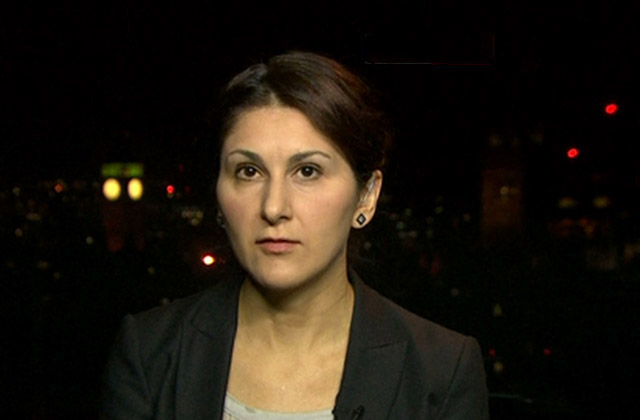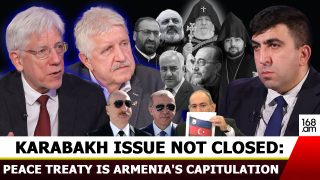
Threat of Big Losses and War will Remain as Long as Armenia Proceeds with its Foreign Policy: Lilit Gevorgyan

Interview with Lilit Gevorgyan, Russia and CIS, Europe senior analyst at IHS Global Insight.
Active developments around Armenia have been recorded recently: works are implemented towards restoration of Russia-Turkey relations, new Russia-Iran-Azerbaijan-Turkey axis is being developed, Turkey launched operations in Syria. The region is in active processes, from which Armenia is left out. What does this quadrilateral cooperation and recent developments promise to the region?
These are rather positive developments for the participant countries. Economic ties suppose closer diplomatic cooperation, although I don’t think that there are solid alliance grounds for instance for Russia-Iran or Russia-Turkey relations. Economically these countries complement one another, accordingly, all of them are interested in cooperation. Politically at least in the forthcoming few years their interests coincide. However, if economic ties will gain strength, development of more serious political axis should be anticipated. Construction of crucial highways, joint investments in oil and non-oil fields, military trade—all these are cooperation components.
This is good news for Azerbaijan. Baku was able to show, that it’s a serious partner, as compared to Armenia. Baku succeeded to lay ground for further economic cooperation with Iran despite Iran-Azerbaijan tense relations, Iran’s aspirations towards Turkish-speaking communities, as well as Azerbaijan’s territorial aspirations towards Persia. This wasn’t accidental, but a result of Baku’s persistent and balanced foreign policy.
At the same time Armenia’s increasing isolation isn’t accidental either. This has direct liaison with Russian policy of actual absorption of the Armenian state. All Armenian former and incumbent authorities equally accepted the variant of becoming a Russian satellite. Naturally, it weakens Armenia’s regional position and economic attractiveness for other countries. By the way, as compared to Azerbaijan, Armenia is an attractive partner for Russia as well. It’s important for Russia to keep Armenia under its perfect control for strategic purposes. Of course, Baku pursues successful foreign policy, however, it was gained exactly due to Armenia’s mistakes.
How will on the one hand, restoration of Russia-Turkey cooperation, and deepening discordances in Syria on the other, be reflected on NK conflict peaceful settlement process and the ongoing situation on the contact line, on account of the fact that one of Turkish officials stated that NK conflict will be discussed in Russia-Turkey-Azerbaijan format?
Firstly, in any case Russia will continue having monopoly regarding NK issue, in other words, become the main “peacemaker.” Russia has only one purpose—not to allow NK conflict final settlement, including military settlement, but use it to keep Azerbaijan and Armenia under its control. At best for Moscow, Armenians will agree to concede some territories to Azerbaijan and Aliyev instead will agree to deploy Russian soldiers in NK as peacekeepers. This variant may be implemented militarily as well, when the Armenian side will lose those territories in a new war, but Russia, to all likelihood, won’t allow Azerbaijan to reach territorial advantage without agreeing to integrate into Russian plans.
Russia-Turkey rapprochement is a serious factor in case of NK conflict. Turkey, of course, would like to get rid of serving Azerbaijan’s foreign policy interests on account of its own interests, i.e. opening of the borders with Armenia. However, Turkish authorities realize, that nationalists won’t forgive opening of borders without preconditions. Thus, for Turkey not NK conflict settlement is important but concession of some provinces by the Armenian side to Azerbaijan through Russia. No matter how close relations between Baku and Ankara are, Turkey observes Azerbaijan as Russian zone of influence. I don’t observe a big role for Turkey. Russia, Azerbaijan, the USA and the Armenian society with clear opposition to Russian current plans have a role in NK issue.
Together with Ukraine and Syria, Russia will speculate its influence in NK conflict. These conflicts are leverages for Russia to show the West that, in any case, at least in neighboring region Moscow is an influential country, a superpower, that cooperation with Moscow comes from the West’s interests, otherwise, active military clashes, instability may be recorded, where the USA maybe will be obliged to use resources. Putin will continue using new escalations in these conflicts to come out of diplomatic isolation.
As we may see, this tactics works in case of Syria and NK. At best, Putin’s purpose is to reach to the point, that the West accepts that its country is a superpower and should occur at the table of leading powers. By control and speculation of conflicts, and not by reaching their settlement, Russia will attempt to make the West recognize it at least in the South Caucasus as Moscow’s zone of influence. Naturally, this supposes, that, finally, pressure will be exerted against pro-West powers in Georgia.
Against the background of these developments the second presidential meeting between Armenia and Azerbaijan has been cancelled, which was to be held in Russia again. Parallel to this, the discourse on inadmissibility of concession of lands continues in Armenia. What impression do you have—which is the issue in negotiations and what prevents the second presidential meeting from taking place?
It’s clear that presidential meeting should extend around the details of Russian plan. It’s also clear that, basically demanding unilateral concessions form the Armenian side may raise discontent in Armenia. Besides, the most important is what Moscow and Baku will agree on, i.e. what Moscow will gain from Baku in case of pushing forward current phase-to-phase variant through negotiations or war. In any case, this is an interim pause, probably, also linked to the forthcoming domestic policy developments in Armenia, Azerbaijan and Russia.
What developments are anticipated on NK conflict zone in future on account of the fact, that you mentioned about the anticipated changes in the conflicting countries: elections in Armenia and constitutional amendments in Azerbaijan?
Threat of war is big, however, we shouldn’t forget that such tense situation may continue, as fear is a perfect tool in hands of Russia. It’s interesting enough that talks on concession of territories has wider sonority in Armenia, but little is spoken about military integration with Russia, and how it weakens Armenia’s statehood, thus, it casts serious doubt on NK’s future as well. Armenian army is one of the most crucial structures of its statehood and any step to change it will have serious implications. Use of war threats is also beneficial for Aliyev.
The April war has seriously strengthened Ilham Aliyev’s internal political positions, as he’s the first president, able to take small, but some territories. He showed that the Armenian army isn’t invincible, and despite accusations in bribery, in any case, Azerbaijani army has been seriously re-equipped throughout recent years. This victorious atmosphere, as well as diplomatic success with Iran and Russia, will help Aliyev in the forthcoming referendum. However, expectations of the Azerbaijanis and settling issues through war have increased as well, simultaneously, economic issues have deepened, which may instigate Aliyev to another military operation. Threat of war and big losses will remain as long as the Armenian side will go on with its current foreign policy.
Yerevan has one strategic ally—Russia. The latter aspires full economic and military integration, however, NK has no place in these plans. Armenia has willingly chosen absolute Russian dependency, hoping that it’ll defend NK, receive economic benefit, from which—cheap energy import and serious investments, as well as armaments by cheaper prices. As we may see, in all issues Yerevan has made a serious miscalculation. Moreover, Armenia doesn’t want and it can’t make its only strategic ally implement its allied responsibilities.
Azerbaijan will continue making productive use of war threat in negotiations, as long as Armenia continues participating in such negotiations, and remains weak and isolated, and Russia is ready to ameliorate its ties with Azerbaijan on account of Armenia’s interests. And finally, this threat will remain, as long as there is no serious counteraction, as it’s difficult to imagine why resources should be wasted to support Russia’s strategic ally Armenia, where both the authorities and almost all systemic opposition prefers Eurasian integration or states, that Armenia doesn’t have allies in the world.
Regarding Azerbaijan, again strategic importance of this country for the West has decreased: world energy market changes quickly, and Azerbaijan has much energy resources. Besides, again, like Armenia, Azerbaijan prefers non-Western values, as both are in hands of narrow oligarch group, ready for the police violence.
How will expansion of liabilities of Azerbaijan be reflected on NK conflict?
It can’t have direct influence. However, by this step Aliyev will more approach to the Putin Russia, which should be concerning for the Armenian side.
By Araks Martirosyan

























